1914
|
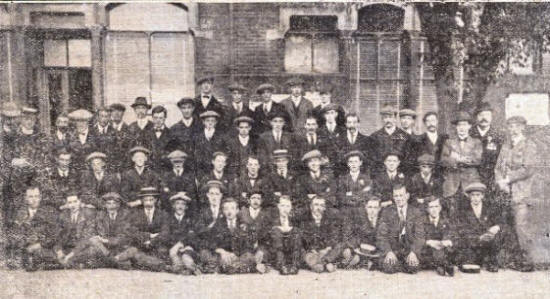
The first Lytham volunteers, outside Lytham Council Offices,
1914.
Hundreds of local men volunteered, 500 from St.Annes alone during
the Kitchener Recruitment Drive.
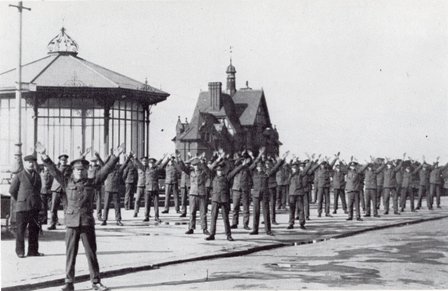
St.Annes volunteers, near the Pier, St.Annes,
1914.
|
|
The Roll of Honour was a list of men who volunteered and were serving
in the Armed Forces and it would appear in the local newspaper or on a board at a place of
work.
St. Annes Express
THURSDAY, DECEMBER 31st,
1914
ROLL OF HONOUR
The St. Annes Roll of Honour, of men who are serving the colours and who have
volunteered for service, contains 217 names, and the war has already taken its toll of their
number.
Two are reported to have been killed in action—Private Isaac
Street, of Clifton Street [now Curzon Road, St.Annes], at La Cateau, on August 26
and Private William Ball, of Clifton Street [now Curzon Road, St.Annes],
in Northern France between December 4th and 12th.
Private J. Unsworth, St. David's' Road North, was wounded at
the Battle of the Aisne; Private George Pollard, of Hope Street, is also reported
wounded. Stoker Martin Stenton, of the 1st Naval Brigade, is interned at
Gronengen, Holland; and Private Richard Crook, of Albert Road, is a prisoner of
war at Gustro, Germany.
|
| |
|
A newspaper article from 1914 suggesting that soldiers should be billeted
in St.Annes.
Troops in Training.
A meeting of members of Parliament representing seaside and other health
resorts, was held at the House of Commons on Tuesday to consider the suggestion that, in view of
the partial failure of the season, preference should be given to resorts in arrangements for the
billeting of troops in training. The Secretary of the Federation of Health Resorts was also
present, and it was decided to make representation on the subject to the War Office.
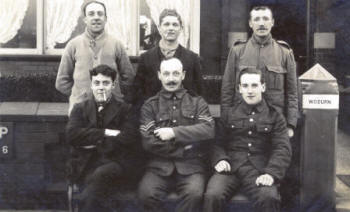
St. Annes Council, we believe, are not members of the Federation of Health
Resorts, and unless independent action is maintained our claims are likely to he over-shadowed by
the larger resorts. The Chairman and Clerk of the Council have visited the military authorities in
response to a request made by the Traders' Association, but, up to the present, the promise that
the claims of St. Annes-on-the-Sea would receive full consideration, has not materialized.
Perhaps the Council may consider, at their committee meetings, next Monday, that
a courteous, reminder of the promise would be of benefit. At all events, it would keep the claims
of St. Annes prominently before the authorities. A few thousand troops, billeted judiciously
amongst company-house keepers who desire them would prove a boon and a blessing during a winter
that is certain to go hard with a large proportion of our population.
The outlook for many of our apartment caterers and retail traders is none too rosy, and the
circulation of several thousands of pounds a week would be preferable to a local distress fund.
Five thousand troops would mean a disbursement of over £5,000 weekly based on the official scale of
3s. a day. Is it not worth a supreme effort before the winter arrangements of the War Office have
been completed? St. Annes is eminently suited for the purpose of drill and manoeuvres. There are
excellent roads in every direction, plenty of open spaces, and sandhills for Scouting.
St. Annes is an old militia. and volunteer training ground and with its sandy
subsoil and almost complete immunity from snow, few localities offer equal advantages. Now's the
day and now's the hour for our Councillors to help in a real sense, a very large proportion of
their constituents and to keep the wolf from the door of many of our householders and shopkeepers.
With more money in circulation the Council will find their task of carrying out improvements much
easier.
|
The Clifton family of Lytham Hall.
Blackpool Times, December 1914
MR & MRS CLIFTON'S KITCHEN CAR
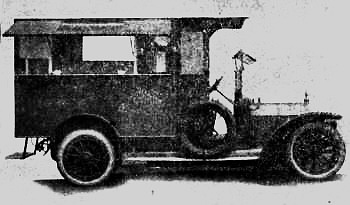
These photographs show the exterior and interior of the kitchen car
which Mr. and Mrs. Clifton has obtained for relieving wounded soldiers on the battlefield.
Donations were contributed in Lytham and St.Annes.
Mr. and Mrs. Clifton were engaged in similar work in Belgium, and came back in order
to obtain a kitchen car. In her appeal Mrs Clifton wrote:
"I have been working in a kitchen at a station in Belgium, and have
been strongly impressed with the necessity of giving food to the sick and wounded. It
almost comforts one, when face to face with their agony, to see the pleasure that a warm
unexpected cup of soup gives the men."
"Those whom I was privileged in helping arrived in open trains, many of
them ill and a great number suffering from frost-bite. When we have picked up our soldiers,
and seen to their wounds as well as may be, we want to give them soup or cocoa. before
having them conveyed to the trains. We want at least to know that they have started their
via dolorosa with something to sustain them, so we have come back to get a kitchen
car."
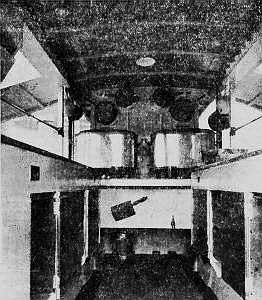
Messrs. Barker, coachbuilders in South Audley Street, very
generously gave a. "kitchen" body, leaving the cost of the chassis and engine to be. met. The
chassis is worth £600, hut cost only £350. The original chassis was not up to the weight of the
body, and a gentleman generously sold Messrs. Barker this far finer one for the price originally
stipulated, in view of its special object.
|
|